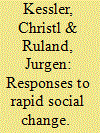|
|
|
Sort Order |
|
|
|
Items / Page
|
|
|
|
|
|
|
| Srl | Item |
| 1 |
ID:
074218


|
|
|
|
|
| Publication |
2006.
|
| Summary/Abstract |
This paper analyzes Korean attitudes towards inward foreign direct investment (IFDI) before and after the 1997 financial crisis, within the context of the debate on the costs and benefits of IFDI and intensifying global competition to attract inward investment. The Korean experience sheds light on the forces driving the liberalization and deregulation of inward investment by countries that had previously restricted and controlled IFDI and on the problems inherent in implementing these policy changes. For more than three decades, the South Korean government maintained a negative or passive attitude towards inward investment, which, despite its potential economic benefits, was seen as a less desirable option than using foreign loans to finance economic development. However, the 1997 crisis brought about a fundamental change in the Korean government's attitude, and led to sweeping policy changes that resulted in an investment boom in the immediate post-crisis period. After this initial success, the subsequent decline in FDI inflows prompted further measures to attract high-quality foreign investment. As the Korean government has discovered, while legal frameworks, promotional systems and structures can be reformed with relative ease, the issue of changing investors' perceptions of Korea and the Koreans' views of the role and value of inward investment is more problematic. Failure to resolve these problems and to develop strong locational advantages will put Korea at risk of losing crucial investments to regional competitors and will undermine efforts to enhance the global competitiveness of Korean firms and to promote sustainable economic growth and development in the years ahead.
|
|
|
|
|
|
|
|
|
|
|
|
|
|
|
|
| 2 |
ID:
074221


|
|
|
| 3 |
ID:
074219


|
|
|
|
|
| Publication |
2006.
|
| Summary/Abstract |
Over the past quarter of a century, China's economic growth, its transition from a socialist to a market-based economy and the integration of the Chinese economy into the global economic system have all progressed significantly. On the other hand, during the same period Japan has been the single largest source of foreign aid to China of all donor nations and international aid organizations, by providing more than half of China's total bilateral aid receipt. This article looks at the role of Japanese foreign aid in China's economic growth and increasing openness, and explains Japan's grand strategy in implementing its aid policy to China. My analysis suggests that there is a positive, albeit indirect, link between Japanese development fund, which is widely known as yen loans, and the growth and increasing openness of the Chinese economy. The evidence also indicates that the link between Japan's provision of yen loans to China and Japan's immediate corporate gains is surprisingly weak. Indeed, Japan has benefited indirectly because yen loans have contributed to the economic growth and openness of China, which in turn make it a better economic partner and more responsible regional neighbour for Japan. In the end, China's economic development, the incorporation of the Chinese economy into the global economic framework and China's transition to a market economy are in Japan's national economic as well as political interests.
|
|
|
|
|
|
|
|
|
|
|
|
|
|
|
|
| 4 |
ID:
074220


|
|
|
|
|
| Publication |
2006.
|
| Summary/Abstract |
Within the last few decades in the Philippines, there has been outstanding growth among Catholic Charismatic and Pentecostal groups and churches, part of a worldwide proliferation of these strands of Christianity. The article is based on qualitative interviews and nationwide survey data gathered in a research project on religious change in the Philippines, and explores the scope and the character of Charismatic and Pentecostal Christianity in the Philippines. It explains the success of this strand of Christianity by its ability to transfer core concepts and techniques of political populism into the religious sphere. The paper identifies the populist themes within the cognitive framework of Charismatic and Pentecostal religion in the Philippines, as well as the populist techniques applied to mobilize followers. The analysis of Charismatic and Pentecostal religion in the Philippines as populist religion, however, does not imply that such groups and churches can be characterized as populist actors in the political sphere. After outlining the core topics and techniques of populist religion, the paper concludes with a discussion of the political impact of these groups in the still crisis-ridden democracy of the Philippines. These potentials are depicted as potentially ambivalent, due to the ambivalent character of populism itself.
|
|
|
|
|
|
|
|
|
|
|
|
|
|
|
|
|
|
|
|
|